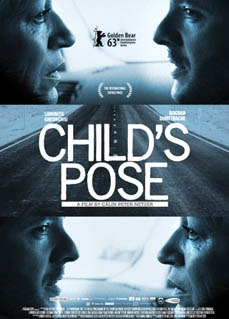
Romania 2013
Starts May 23, 2013
Directed by: Calvin Peter Netzer
Writing credits: Razvan Radulescu and Calin Peter Netzer
Cast: Luminita Gheorghiu, Bogdan Dumitrache, Natasa Raab
Length: 112 minutes
 This year the Romanian Film Child's Pose claims the Golden Bear. It is the first time in the History of the Berlinale that the Golden Bear has been given to a Romanian film.
This year the Romanian Film Child's Pose claims the Golden Bear. It is the first time in the History of the Berlinale that the Golden Bear has been given to a Romanian film.
Director Calvin Peter Netzen focuses on the high-class sector of Romania which is hardly ever a subject in films coming from this country. Cornelia (Gheorghiu) turning 60 is miserably and intensely focused on her only son Barbu (Dumitrache). She sees herself as a self-sacrificing mother whose only wish is to shower her adult son with love and protection, an unwanted love that he rejects at every turn. In fact, he does his best to avoid her at all cost. But when Barbu accidentally hits and kills a child, this tragedy gives Cornelia the perfect opportunity to regain control over her son’s life. In fact she is willing to financially sacrifice and willing to deal with the low-level corruption in order to save him from prison. (Netzen explained that Child’s Pose is a yoga position but actually wanted to use it to describe the position the child has in the relationship.)
Luminita Ghoerghi steps right into her character and masters this unconditional suffocating love where we, the audience, cringe at the thought of someone acting that way to us. The scene that sticks in my mind the most is when Cornelia puts on rubber gloves and is rubbing Barbu’s back in order to sooth him after the accident which leaves a feeling that something isn’t right. The director uses this strange sticky sound of the gloves to show how this is a barrier between them which is artificial but somehow protects Barbu against his mother. He uses scenes to show that even the housekeeper gets bribes in order to tell the mother what is going on in his apartment even to what books he is currently reading. She wants to know about his relationship with a girl whom she doesn’t approve of and then somehow does her best to destroy the relationship.
At the Berlinale 2013 press conference, both Calvin Peter Netzen and Razvan Radulescu, who wrote the screen play, said they were inspired by their mothers. Their mothers weren’t as extreme in this role of a pathological mother-son relationship but there is this tendency for parents to smother their children with either love or material objects and never let the child develop their own personalities. This film also dives into the social class system in Romania. We see the contrast between the classes as well as the low-level corruption that keeps the lower classes economically afloat. Netzen said at first he thought this film would appeal to women, to show how a mother’s excessive love could destroy, but then he recognized his own relationship with his mother where he could think about forgiveness, acceptance and understanding. When I saw this film, I have to admit that I, too, could relate to the son who has a mother who tries to control the relationships around her which is something that my mother also was capable of doing. I predicted this film would win the Golden Bear at the Berlinale 2013. It had that mix of a universal theme which we could all relate to, but, at the same time, did it with a unique story that was very personalized and had all the qualities that made the audience uncomfortable but remained compelling at the same time. ()
